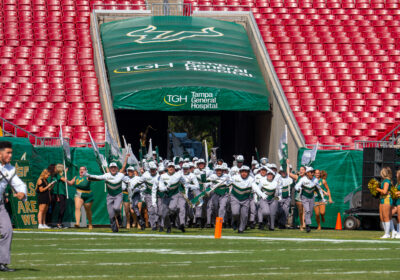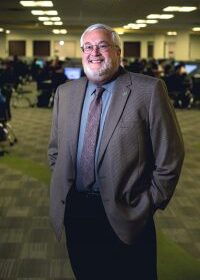Two events close out Islam Awareness Week

The Muslim Students Association hosted events such as Hijab 101 and Muslims in America as a part of their Islam Awareness Week event. SPECIAL TO THE ORACLE.
Students will put their books down and make plans with friends on Friday. They’ll exhale for the first time since Monday morning, because Friday is the day of the week students can unwind.
For the Muslim Student Association (MSA), they’ll relax, but in their own way, as they use a portion of their Friday to get together and pray.
According to club president and biomedical science major Munazzah Bagdadi, the prayer is held every week they’re allowed to, MSC regulations permitting, as clubs aren’t allowed to book rooms in the building during finals weeks and reading days.
These prayers are always open to Muslim and non-Muslim students alike to participate in. It starts with a 20 minute and concludes with a quick five minute prayer.
The event being held today at 5 p.m. in MSC 3708 is aptly named ‘Hijab 101’, as the goal for this one is to enlighten non-Muslims about the true nature of the religious headdress.
It is one of many events planned for Islam Awareness Week.
“The whole purpose of that event is to really teach people the fact that the head scarf that we wear isn’t, and shouldn’t, be a symbol of oppression, but rather it should be one for feminism,” Bagdadi said.
She went on to say that the wearing of the hijab is optional for Muslim women, contrary to the beliefs held by some non-Muslims.
“The whole event is to show that behind this head piece, there’s courage,” Bagdadi said. “Every morning when a girl wakes up and puts on her hijab, she’s taking upon herself the sacrifice of representing her religion and going out in a society where what she’s wearing on her head might be seen as a negative, when it really is a positive.”
This event will feature multiple Muslim hijab-wearing women interacting with people and talking about their experience with it. Students will learn about their journey wearing the hijab through different mediums, including spoken-word poetry.
This leads into the prayer Friday. The midday prayer is highlighted as important to practitioners of Islam because Friday is translated to “Day of Assembly” from Arabic. It will start at 1:30 p.m. in MSC 3707.
Even though praying at a mosque is not mandatory, it is encouraged for Muslims to try to get to one. However, this is not always an option.
“Not every member has access to a mosque,” Bagdadi said. “Some members have classes they can’t miss or they can’t find a ride to a mosque. Having the prayer on campus allows every member to join.”
The first event presented was a lecture titled ‘Misconceptions in Islam’ given by Mamdouh Elsayed on Monday. Elsayed is a teacher at a local Islamic school and is described by Bagdadi as someone who connects well with young adults and an engaging speaker.
For their second event on Tuesday, ‘Muslims in America’, Hassan Shibly, the chief executive director of the Council on American-Islamic Relations (CAIR) Florida, spoke to the students about raising awareness for the religion and how to keep their faith at a time when they feel as if they are being treated differently than the rest of the country.
The timing of the week-long event aimed at raising knowledge among students about Islam may seem strategic by some because of the recent immigration ban put on seven countries whose populations are predominantly Muslim. According to Bagdadi, this isn’t what happened.
“This isn’t something new,” Bagdadi said. “This is something that we have every year. Sometimes it’ll be a month. Sometimes it’ll be a week. Sometimes, we’ll just have events that are for awareness. We just don’t dedicate a whole week to it.”
The ‘Islam Around the World’ event on Wednesday, showcased the variety of cultures in the Islamic community around the world with multiple booths set up showing how the religion has influenced different aspects, such as food and clothing, in various countries.
She went on to say that while most of the attendees at these events are Muslim-practicing students, she estimates that about 10 to 20 percent aren’t. She thinks that it might sound like a low number, but it’s not about that. To her, it’s about making a difference and changing someone’s common misconception on Islam. She believes that changing one mind might lead to that mind changing another.
And so on.
“It is a place for Muslim students to come together and have a safe space and a community to interact with each other but we’re also here to normalize the fact that we’re not different than the regular student,” Bagdadi said.
Additional reporting done by Nicole Cate.






